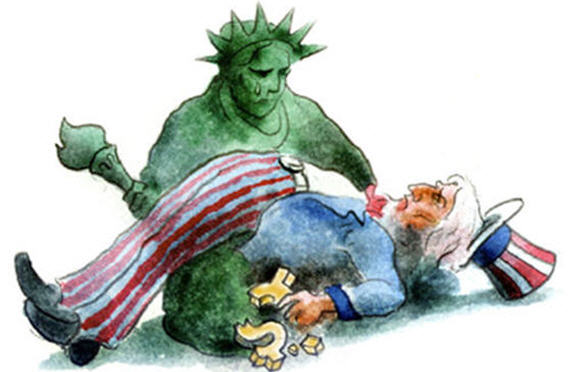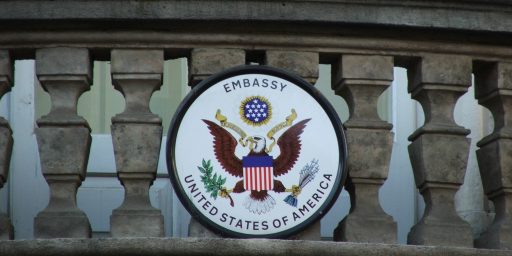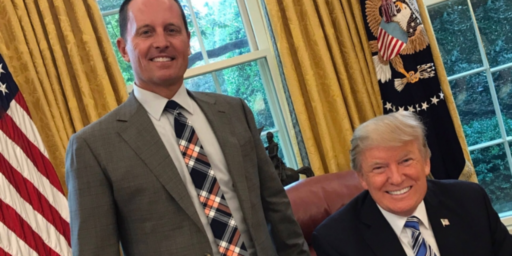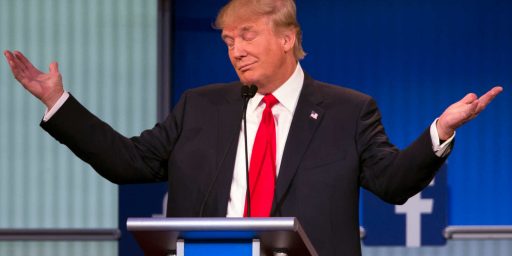Party and Country
Ppartisan politics no longer stops at the water's edge. This is a bad sign for the Republic.
Mitch McConnell’s candid admission that partisan politics is playing some role in Republican opposition to the war in Libya is refreshing. The fact that partisan politics no longer stops at the water’s edge, however, is a bad sign for the Republic.
McConnell was speaking theoretically, not tactically. Asked about the notion that Republicans are suddenly showing an isolationist streak, the Senate Republican leader observed, “I’m not sure that these kind of differences might not have been there in a more latent form when you had a Republican president. But I do think there is more of a tendency to pull together when the guy in the White House is on your side.” He added, “a lot of our members, not having a Republican in the White House, feel more free to express their reservations which might have been somewhat muted during the previous administration.”
While some are condemning this as naked partisanship, it’s simply the truth. The United States has been involved in more overseas military operations over the last 20 years than I can recount off the top of my head. During the administration of Democrat Bill Clinton, most of the opposition came from Republicans. When Republican George W. Bush took office, suddenly it was Democrats who wondered about the wisdom of intervention in other people’s civil wars. With Barack Obama, the shoe is back on the other foot.
Given that none of the interventions aside from the initial punitive strike against Afghanistan in the wake of the 9/11 attacks have been slam dunks, it’s not only natural but good that there has been substantial concern in Congress. And it’s only natural, if not necessarily good, that members of a president’s party are less likely to speak out in the marginal cases. Not only do they have an interest in maximizing their guy’s power but attacks on his positions by the other party tends to spark a defensive rallying by members of his “team.”
So long as it doesn’t go beyond this and into either dutiful cheerleading for wars that Members strongly oppose or partisan sabotage of wars they strongly believe in the nation’s interests, I’m not particularly troubled by it.
For some, however, war is an extension of politics by other means rather than vice versa. Earlier in the week, I made light about former UN Ambassador John Bolton’s declaration that he wouldn’t serve in the Obama administration. I had intended a more serious follow-up post but events intervened. I’m deeply troubled by Bolton’s assertion, clearly directed at dark horse contender Jon Huntsman, a conservative Republican who served as Obama’s ambassador to China: “There is no patriotic obligation to help advance the career of a politician who is otherwise pursuing interests that are fundamentally antithetical to your values. That’s not the call of patriotism,” he says. “I don’t understand it. This is not like World War II, when we are facing an existential threat to the country as a whole, and you do put partisanship aside.”
Even leaving aside that Bolton spent the last administration arguing that Islamic extremism was indeed an existential threat, this is a dangerous notion.
As with Bolton, my chances of being asked to serve in Obama’s administration are remote, indeed. And, certainly, I would turn down an offer to serve on his domestic policy team were one inexplicably made; I oppose much of this president’s domestic policy agenda and principle would preclude my either helping to advance it or pledging him my loyalty and not giving it. But I would have no compunction against taking an appointment in a defense, intelligence, or foreign policy capacity.
While there are some partisan differences on America’s relations with China, all sensible people agree that strong trade and diplomatic relations with the world’s most populous nation is crucial. Huntsman was extraordinarily well qualified to be our ambassador, having not only served as a state governor but also stints as ambassador to Singapore and as deputy US Trade Representative. And he speaks fluent Mandarin and Taiwanese Hokkien to boot. Why wouldn’t he agree to serve his country and his president in this capacity?
American foreign policy should be and generally has been remarkably stable from administration to administration, regardless of party. Two days after the 2008 election I predicted, echoing Paul Heutching, that “Obama is an American politician, and he will govern like an American president.” I assumed then and believe I’ve proven correct that Obama’s policies on war, diplomacy, and trade would be very similar to Bush’s because, at the end of the day, they would be based on America’s interests as seen through the lens of American diplomats, soldiers, and intelligence analysts. And, as Harold Macmillan famously cautioned, “Events, dear boy, events.”
I’m reminded of the old aphorism “For God, for country, and for Yale.” We all have loyalties and rooting interests. But they should be hierarchical and distinct. Bolton’s willingness to serve on Obama’s foreign policy team should be only slightly more influenced by the fact that Obama is a Democrat and he a Republican than by the fact that Obama went to Harvard and he went to Yale. Country trumps both party and school rivalry.
Given that I am outside of government, I will happily continue to oppose the foreign policy decisions of presidents of both parties when I disagree–a frequent occurrence these past two decades. But the differences are based on my assessment of what’s in the American interest, not whether the president is wearing a blue or red jersey.







Of course, I’d rather that our “leaders” be consistent and act in good faith. But that’s not gonna happen. Given that, I’m not so sure politics stopping at the water’s edge is really a bad thing.
Lemme ‘splain. Seems to me we get into too many wars. If the only possible stumbling block is partisan politics, well… I guess I’ll take some partisan politics.
Granted, this could cut the other way, making peace-making harder too. Maybe. I’m just thinking out loud here.
@Rob: Yes, there is that. But I think the evidence is clear that partisan politics works in the direction or more, longer interventions.
As I’ve argued at length elsewhere, neocons and liberal interventionists have strong structural advantages in promoting intervention. Presidents, especially Democratic presidents, are subject to pressure on the charge of being “weak.” And, once committed, it’s almost impossible to de-commit because of the “surrender” chorus.
Hard to argue with that, James.
Something else bugging me… did politics every really stop at the water’s edge? Was it perhaps an unusual period (say end of WWII until Vietnam got bad?)? I really don’t know, as it’s not something I’ve really looked into or even thought about much. But we do, all of us, have a tendency to identify something we don’t like (x) and then assume that x is new, or worse than before. Oftentimes it turns out x has always been there, and was worse at other times (example: partisan vitriol).
I think you can go back to the War of 1812 and see similar partisanship; indeed, Federalist opposition may have destroyed the party. This was preceded by years in which domestic policy arguments were loosely packaged with either a pro-French or pro-English disposition.
I believe our two-party system pushes people into camps on foreign policy that can be artificial. The fear is that a great success for a President in foreign policy will advance his unrelated domestic agenda, or a President’s failure will derail it. These are the seedbeds of opportunism and hypocrisy.
As between hypocritical inconsistency and consistent deferral, I vote for hypocrisy. Let the Republicans challenge Obama on grounds they never raised against Bush.
McConnell’s “admission” is nothing new. The need for a war-making check on the executive branch specifically and to ensure that our constitutional checks and balances function as intended generally is a rationale for a divided government voting heuristic – always voting to maintain a divided government state at the federal level. Always.
Stephen Slivinski and William Niskanen have made a statistical case that we are less likely to become embroiled in extended ground wars during periods of divided government. Mitch McConnnell simply explained why this is the case.
I think McConnell was copping out by hinting that it’s just good ‘ol tit-for-tat partisanship. Jump up to 50,000 feet and look around. The so-called republicans have taken the strategic position that doing harm to the country helps them politically. Even that dolt Schumer has figured it out.
hey norm, the stupid party is just learning from the evil party.
I think General Petraus’ recent comments in response to Senator Levin’s questions about resigning if he didn’t agree with the President during his CIA Confirmation are rather appropriate to this discussion.
austin…you said one correct thing yesterday…don’t try to run before you can walk.
The costs for Bosnia, IIRC, were about $6 billion-$10 billion. The total costs for Clinton interventions was, very rough estimate, maybe worth two months of Iraq time. Other than that, I largely agree with James. He avoids mentioning the country where we have really left the water’s edge, israel, not that I blame him.
Steve
James:
I agree and it’s good to see someone say it. Party loyalty should be about ten places below loyalty to country. Bolton’s attitude is nauseating. I was in no danger of taking him seriously before, but now he’s shown himself to be not just obtuse and obnoxious but un-American.
It’s not like the Democrats didn’t play politics with Iraq. Doubly so for liberals. I doubt that the saying partisan politics stop at water edge was ever all that accurate. However I think there is much less of it.
As for Libya, Republicans are not the only ones that have an issue with it. Over a 1/3 of the Democrats in the House voted against it. That sounds pretty bi-partisan to me. It is a hell a lot more than when Pelosi claim bi-partisanship on the health bill with very few Republicans voting for it.
Just because someone disagrees with a President’s foreign policy doesn’t mean they are being partisan either. However one should use tact and give a certain amount of leeway toward teh President. A politician should not say a surge has failed or we lost a war when it is far from being true. But he was a Democrat so I am sure that is fine with many of you on the left. Anyway giving a President leeway doesn’t mean one has to fall in behind him lock stock and barrel and blindly fallow.
While that may not speak well of Democrats/liberals then, it certainly doesn’t excuse the actions of Republicans/conservatives now…
Tell that to Mitch McConnell…
Oh? So I guess Iraq really is a wonderful place now? By the way, a politician shouldn’t have made specious claims linking Iraq to 9/11 to get us into that war in the first place…
Frankly, I think Bolton made the statement to try and trump Huntsman as a viable primary candidate. He probably does believe it but many others will be saying much the same thing if Huntsman appears to progress in the various primaries. Bolton would have said the same thing about Robert Gates had Gates entered the political fray.